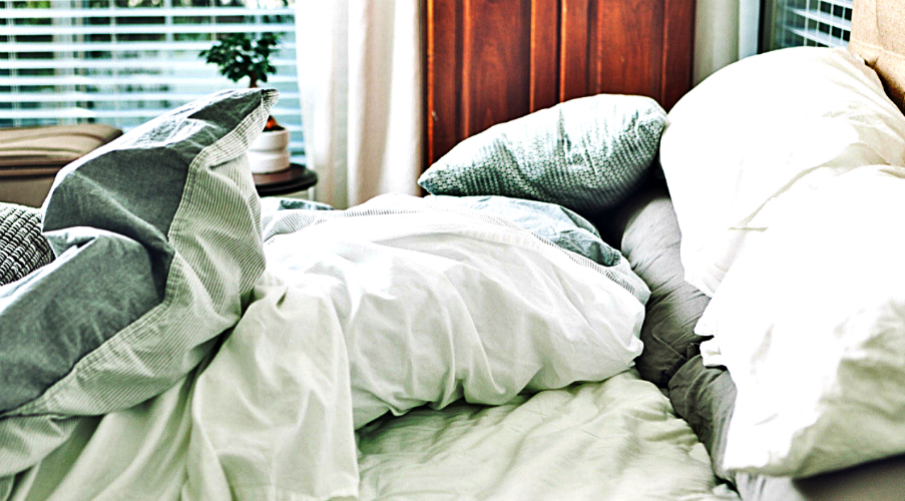The world is changing rapidly, technology advances exponentially and humanity is evolving every single day. We need to learn to adapt quickly.
Our society has grown and developed, every aspect of our lives has changed and we need to adapt to this new environment.
These changes cover everything from our eating to our sleeping habits, from what’s healthy to what’s not.
We have more than enough information about what’s healthy to eat, but rarely does anyone speak about sleep.
Considering that quality sleep is more important for our health than exercise and diet combined, how can you make sure that your sleep isn’t suffering the changes of modern environment?
Healthy Advices for Adapting Our Sleep to a Modern Environment:

1. Stay away from LED before sleep.
One of the biggest changes that tend to have a negative effect on sleeping habits is screens, specifically the blue light they emit.
LED blue lights are usually found in televisions, phone screens, and laptop screens, along with other electronic devices and some fluorescent lighting.
We tend to encounter these devices regularly throughout the day and usually spend time exposed to them in the evenings, as well.
A Harvard study recommends that we stay away from blue light in the two to three hours before going to sleep to ensure that your sleep isn’t affected by the disruptive light.
2. Try latex mattresses to fight the heat.
The shift in the environment with global warming and climate change has also lead to issues for many as they try to sleep.
Summers are getting hotter, and sleeping in the hot weather proves difficult for most people.
While some will choose to use a fan which, according to The Coventry Telegraph isn’t an ideal solution, there are other ways to combat the heat.
A popular way to deal with the hot nights is to opt for a latex mattress. Latex mattresses are specially designed and are very different from a standard mattress.
Latex mattresses and memory foam mattresses offer many of the same benefits, as both are pressure relieving and motion isolating.
You can find both of these mattress types available in several levels of firmness, as well, allowing you to get what works best for you.
Along with this, latex mattresses are naturally cooling, so they don’t retain heat as much as some other mattresses.
The improved airflow these beds offer means your body heat can escape from the mattress instead of being stuck within, allowing you to feel cool and sleep more restfully.
These beds are also recommended for those suffering from allergies, as latex mattresses were created to provide an alternative to cotton or horsehair.
3. Reduce noise and light pollution.
Noise and light pollution are also reasons many of us find our sleeping pattern disrupted.
Recently, a Harvard study looked into the connection between light pollution and insomnia and found that the more light pollution their participants were exposed to, the more likely they were to use sleeping medication.
There are many organizations looking to reduce light pollution, but there are things that you can do at home to reduce its effects, including closing windows, blinds, or curtains in the evening, as well as blocking out potential streetlights outside, as this can help you fall asleep quicker.
The effect of noise pollution on your sleep is more adaptable than light pollution but tends to affect many people, as well.
Depending on where you live will change the type of noise pollution that may affect you, but often it’s constant cars, trains, or planes, or even noise from a building or construction site.
These sorts of noises can be incredibly disruptive and can lead to a short temper, irritability, and potentially reduce your ability to deal with stress.
If you’re struggling with noise pollution, the good news is that you are able to take steps to reduce the effect that it’s having on you.
A quick and easy way to block out noise pollution is earplugs, though many feel they are uncomfortable.
You can also look into getting double glazed windows if you don’t have them already, as this will help keep some of the noise out.
More easily, you can choose to rearrange your room if your bed is next to the window.
It could make a big difference moving even a few feet away from the window.
Lack of Quality Sleep Increases Levels of Stress:
Finding ways to adapt to a modern environment is incredibly important. Lack of sleep has several detrimental effects, ranging from fatigue to high blood pressure, which is why it’s key to take any precaution to make sure you’re getting enough sleep.
A lack of sleep can also increase stress levels, which is something we all want to avoid.
A key part of sleeping well is having the best mattress, and so making sure that your mattress offers the right levels of comfort and support can make the world of difference.
Bert H. Jacobson, Ali Boolani and Doug B. Smith studied the changes in back pain, sleep quality and perceived stress after the introduction of new bedding systems, and found that new bedding reduced back problems and increased sleep quality, both helping to reduce stress levels.
Adapt with The Environment for Health:
Overall, there have been many changes in our environment that have changed how we sleep.
Being able to work around these changes in our modern environment is really important, and actually easier than one might think at first.
Implementing little changes, such as ensuring you are sleeping on the correct mattress for you, not using technology before bed and wearing earplugs if you live in a louder area can make a world of difference, and allow you to sleep soundly.






